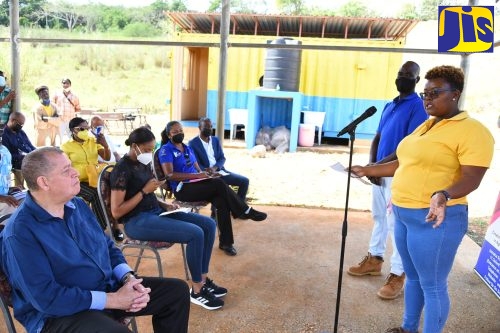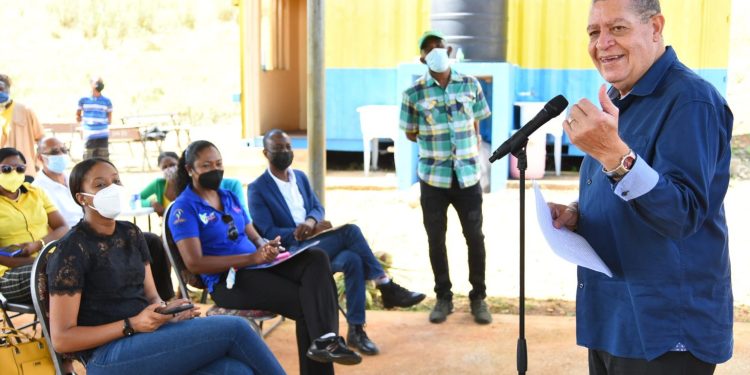Farmers are hailing the Content greenhouse project in Williamsfield, Manchester, for enabling them to increase production and earnings, while adding economic value to the community.
The project, which got under way in 2017, involves the revitalisation of former bauxite lands for agriculture production.
Forty-three farmers are engaged in cultivating crops such as cucumber, sweet potato, cabbage, lettuce, hot pepper in 20 greenhouses, and rearing small ruminants such as goats, supplying hotels, supermarkets and other markets.
President of the Content greenhouse project, Earl Williams, said that the group of farmers has produced some 100,000 pounds of crops, with earnings of approximately $16 million.
He notes that 30 per cent of the earnings is “put aside for rainy days” to ensure that the venture is sustained.
Mr. Williams, who was speaking at a recent community meeting, said that the “project has brought back life to Williamsfield,” which has been impacted by the downturn in bauxite production.
In turn, he said, the “community has been good to us” by ensuring that the farms are protected.
Mr. Williams said that the economic setback, brought on by the impact of the coronavirus (COVID-19) epidemic, put a damper on production, but noted that the project is well placed to take advantage of the opportunities on the horizon.
He said that farmers have benefited from the “best training in farming as a business” through the Rural Agricultural Development Authority (RADA), and partnerships have been developed with buyers and value-added producers for the sale of the high-quality produce.
Public Relations Officer for the Content Farmers’ Group, Kerise Mighty, who is the youngest member of the group, and one of only three female farmers, said that the initiative “has maximised the earning potential of farmers, which has overflowed into the community”.

She said that the initiative is adding value to the area, providing a training ground in greenhouse technologies for tertiary students and serving as an educational tour site for primary- and high-school pupils.
“We are doing something good and all farmers are certified in greenhouse technologies,” she boasts.
The Content greenhouse project is part of the Jamaica Bauxite Institute (JBI)/Jamaica Social Investment Fund (JSIF) Greenhouse Cluster and Water Harvesting Project, which is being undertaken through support from the World Bank-sponsored Rural Economic Development Initiative (REDI).
Under the initiative, mined-out bauxite pits are converted into catchment ponds to provide irrigation water for greenhouse and open-field production.
The project, which has been operating in eight communities across the parishes of Manchester, St. Ann and St. Elizabeth since 2014, aims to provide sustainable livelihoods for residents of mined-out bauxite communities.
It also seeks to improve agriculture and tourism linkages, enhance access to markets, and strengthen climate-resilient approaches for targeted beneficiaries.
In March 2021, JSIF and JBI signed a Memorandum of Understanding (MOU) for implementation of the second phase of the project under REDI II.
Some 320 greenhouse farmers and their households, including vulnerable groups and persons with disabilities, are slated to benefit over a five-year period.
The JBI nursery was the provider of the seedlings for the start-up of the initial 160 greenhouses and continues to supply the clusters when orders are received on a commercial arrangement.
Project Coordinator at JBI, Clarence Osbourne, said that the Greenhouse Cluster and Water Harvesting Project, which started in Tobolski in St. Ann, is one of the single largest investments in small-scale agriculture in rural Jamaica.
It represents contributions of $200 million from the JSIF, more than $100 million from the bauxite companies, almost $150 million from JBI, and support from the Social Development Commission (SDC).
For Chairman of the JBI Bauxite Community Development Programme (BCDP), Angus Gordon, the project is “just one example of how the JBI is reinvesting earnings from the bauxite sector to improve the lives of Jamaicans”.
He said that more than 1,000 farmers have seen increases in crop production and benefited from training that “allows them to work effectively with new technologies in the field of agriculture”.
General Manager of the JBI, Stevie Barnett, for his part, said the project is “a wonderful thing that we have done with the bauxite lands”.
“There was a belief that the mined-out lands were useless but, to date, they are also being used for water harvesting,” he pointed out.
Project Manager with the JSIF, Kemeisha Batchan, noted that the coming together of JBI and JSIF under the Greenhouse Cluster Project has been fruitful, increasing crop yield and transforming the lives of the beneficiary farmers.
“It has increased their earnings. Continue to maximise on the support and the training,” she urged the farmers.
A source: https://jis.gov.jm/










